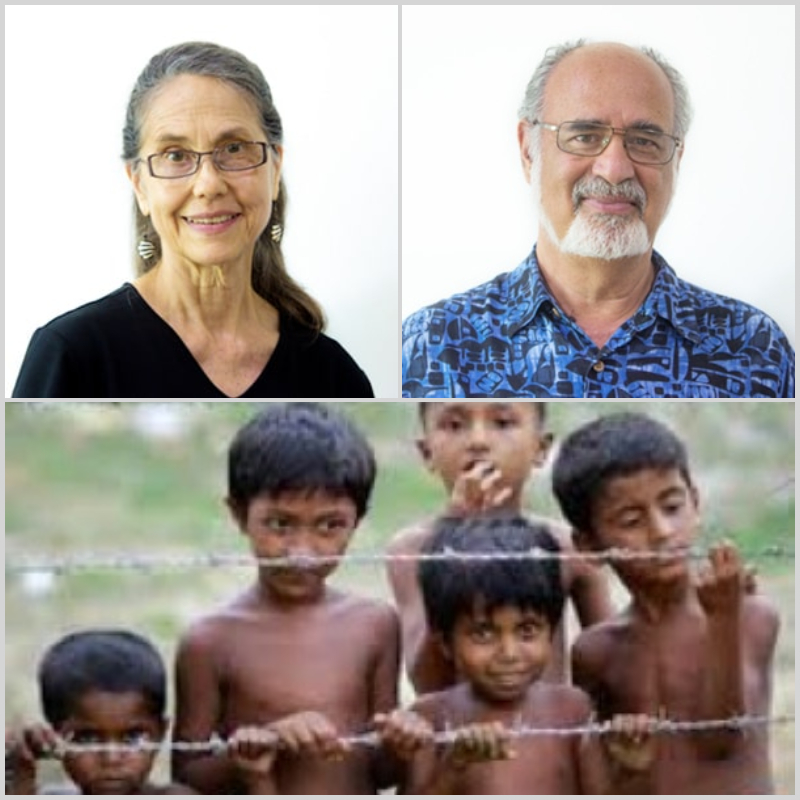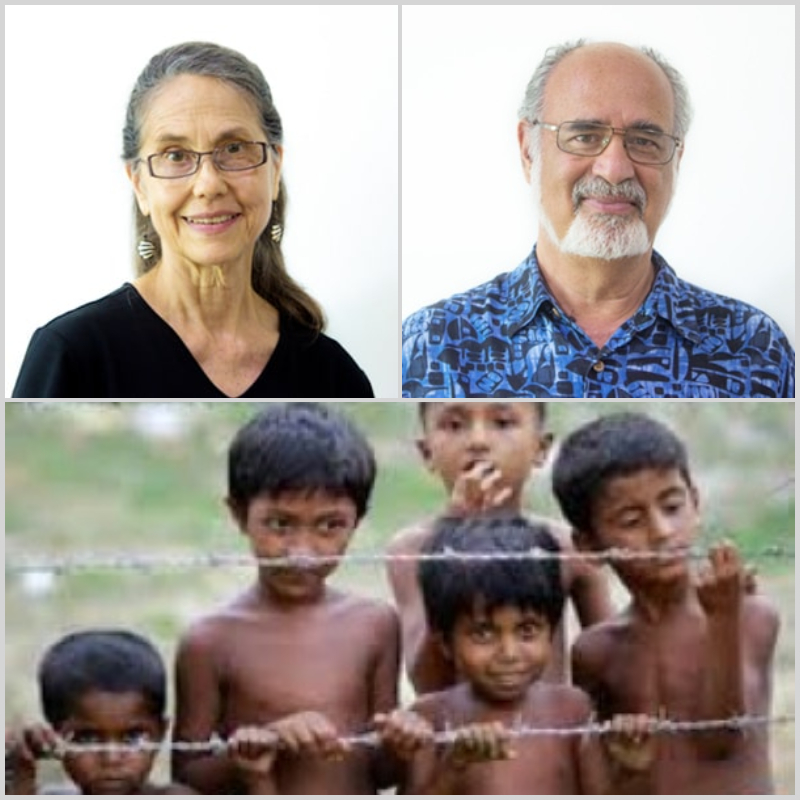
Gale Metcalf and Joel Wallach were teachers at ISKL in the late 1970s, at a tumultuous and fascinating time in the region’s history, with the fall of Saigon indirectly being the reason they were employed in Malaysia. At the core of their lifelong work, which has taken them around the globe, and back to Malaysia, is service to vulnerable communities. These days, that takes the form of volunteer work with an inspiring NGO in Penang, their new Malaysian home. Gale shared their journey with ISKL’s Lynette MacDonald.
LM: What brought you and Joel to Malaysia in the first place?
Joel originally came to Malaysia in 1968 as a Peace Corps Volunteer assigned to the Trengganu General Hospital as the country’s first State Health Education officer. He did that for two years and then was invited to teach an applied anthropology course at the Public Health Institute in KL. His task was to prepare urban Malaysian public health nurses and sanitarians to work in the rural areas.
We met in 1971 when I (Gale), having recently completed a Masters in Public Health at UC Berkeley, was awarded a fellowship to work at the Institute, basically taking over Joel’s classes. Joel had finished his Peace Corps service and was headed back to grad school in New York. After completing my one-year commitment at the Public Health Institute, I joined Joel in NYC – where the real culture shock happened for this California girl!
Grad school was followed by a year in Virginia Beach where Joel worked as the Drug Abuse Training /Treatment Supervisor for the City and I ran a free clinic. Ten months of backpacking through Asia followed, with Malaysia as our final destination. In 1977 we were hired by the American Association of Malaysia to start and run the Community Counseling Program of Malaysia. Some might be surprised to learn that the program was started in an effort to reduce the risk of ISKL teens getting caught up in the drug epidemic that was sweeping Malaysia at that time.
In 1975, when Saigon fell, the very pure heroin that had exited from there for Western markets passed instead through Thailand, Malaysia and Singapore. Overnight these countries experienced a serious drug crisis as some of that heroin was diverted for local use. The heroin was so pure that users simply sprinkled it on the tobacco of a cigarette and inhaled the smoke to get high. This is also how they quickly got addicted.
We set up shop in a house on Jalan Pimping that served as our home, office and the counseling center. In order to establish ourselves as credible, trustworthy adults with the students, faculty and parents, we taught an elective Social Studies course, Human Relations, and spent half of our time on campus conducting outreach activities to potentially at-risk kids. This included programs for students new to the school to help them with adjustment issues. We worked in close coordination with the School’s counselors, first Jerry Booze and later Chip Barder. We also coordinated our efforts with the Teen Center, established by the AAM as a positive place for kids to hang out after school and on weekends. In addition, that first year we chaperoned the Senior Trip. (Oh, the stories we could tell!)
LM: What is your favorite memory of ISKL?
We really valued the closeness that existed among the teachers, staff and students. Perhaps because the school was small, it felt like a family. We are still in contact with some of our students from so many years ago.
LM: Why did you choose to move to Penang, and was that directly from KL?
We left Malaysia in 1980 to set up another expat mental health center in Cairo, Egypt (1980-87). We followed that with a move to Taipei where we established our third center (1987-1995). Ten years with Peace Corps (Philippines, Tanzania, Sierra Leone) and a few more years working in development (Kenya, Cambodia) completed our full-time work. It was at that point in 2006 that we decided to move to Penang.
Penang offered us a welcoming, comfortable and familiar environment where we could work professionally as part-time consultants with the international business community here and in the region.
LM: Fast forward to your life in Penang… How did you become involved with Aspire? What sort of work do you do with the mainly Rohingya community?
Since establishing ourselves in Penang, we have divided our time between paid work and volunteer activities. The paid work primarily involves training and coaching staff of local and multinational companies on cross-cultural management skills and critical thinking skills. About two years ago, when the volunteer work we had been doing with an NGO here in HIV/AIDS came to an end, we looked around for something elsewhere our skills could be of use. That was when we discovered the Penang Stop Human Trafficking Campaign (PSHTC). We began meeting weekly with their two Rohingya community outreach workers, mentoring them in everything from the value of a “to-do list” (our first session) to how to prepare proposals and budgets and give effective presentations. Over time, the work being done with the refugee community was organized as ASPIRE Penang, still part of PSHTC. See www.aspirepenang.org for more information on this amazing organization doing a world of good.
LM: A guiding principle of ASPIRE Penang is “Nothing About Us Without Us” – which really speaks to the way disadvantaged communities often are given help rather than supported to help themselves. How important is this principle?
This is a core and guiding principle of ASPIRE Penang. All work allowances go only to refugees. Our two community outreach workers and our three pre-school teachers are all refugees. We work to develop leadership skills among members of the refugee community as well as provide classes in English and computer skills to promote self-sufficiency. Refugees conduct research into the needs of their community and use that information to design appropriate interventions.
LM: We hear about the negative impacts of voluntourism on vulnerable communities, and this is taken very seriously by ISKL when planning school trips (like our GAP trips in High School). What advice do you have for anyone, including ISKL families and Alumni, who wants to help?
When contacting a group like ASPIRE Penang, listen, really listen to what they tell you they need. In the case of ASPIRE for example, there is not a lot of hands-on help that you would be able to provide, given that most of the refugees served are Rohingya and do not speak English. Some people come wanting to give donations of clothing or toys. However, what the organization need is funding, not material donations.
If anyone would like to learn more about the Rohingya refugee community or ASPIRE Penang, feel free to contact us at [email protected].
LM: Can the Rohingya “problem” be solved? What will it take? What are the main challenges?
See the website for a discussion of the issues. At base, the problems faced by the Rohingya will not be solved until the military leaders in Myanmar are put under enough pressure/sanctions so that they stop their relentless campaign of genocide against the Rohingya and return to them the rights of citizenship which were stripped from them.
LM: Do you still teach?
We still conduct workshops in cross-cultural management, communication, para-professional counseling and critical thinking for local and international and local companies, organizations and NGOs.
LM: What are your plans for the future?
We plan to keep doing what we are currently doing – which also includes time as grandparents to our two granddaughters, age four and seven, in Australia.


